local report
If Streets Around the World
Unite Hand in Hand
It Will Turn Into a Tremendous Power
As the International AIDS Day (Dec 01) coming just around the corner, I have once again landed to Republic of Malawi in Africa. My purpose was to make my 2nd local research to support urgent needs of the HIV patients & to help the so-called “AIDS orphans” to be independent, which are the main theme of the current African JAG Project launched this year. As I have stated in my report from my first visit, the situations with HIV/AIDS in Malawi are extremely severe. I’ve met a lot of HIV patients this time as well. I also heard thorough explanations about the situations the children in orphanage homes are currently placed into.
I also met children who got infected in their mothers’ wombs. And I re-visited the patients I met on my last visit as well. I would like to make a thorough follow-up report of my visit this time diving it into a few segments.
REPORT 1 - URGENT SUPPORTS
A boy holding a free coupon
Since the total sales of the JAG benefit CD hasn’t recouped the album production fee yet, the supports this time (stated below) have been done using the donations made from Japanese contributors to JAG Project (financial report including these donations and detailed use will be made soon).
The private hospital in partnership with JAG
Urgent Support District= Chembe, Malawi There is a village on the shore of Lake Malawi called Chembe which has population of 10,000 people. It is a village that 50% of the population is said to be HIV positive. In this village, there is a private hospitalb run by Irish NGO. Although it costs 50 yen (approx. US$0.50) to see a doctor, which is too expensive for the poor people (living costs per day in Malawi is approx. US$1.00). In order to get to the national hospital, which is their alternative, they need to travel 90km and costs 800 yen (approx. US$8.00) for transportation. To get to the facility offering blood tests, need to travel 20km & pay 300 yen (approx. US$3.00) for transportation. Definitely not something that poor people could afford. I learned of such situation upon my April visit. So I took the following action with the donations we received from Harajuku’s street brand Revirth, visual collective ZERO-SAN, Es.U.Es, Natur, and other individuals based in Japan:
Support1
Made Fee Hospital Coupons for 2,000 People
(1) We gave 1,000 coupons to Mrs. Rose, a visiting nurse looking after people in Chembe, to Mr. Furukawa, a cooperating volunteer from Japan living in this village and looking after the children, and to Peter who made a band by orphans to help them to make their own living. Since they know most of the villagers, we asked them to distribute the coupons to who ever they see is needed. I also asked the three to sign their names on the back of the coupons they distribute so that hospital as well as we would be able to know who actually given out the coupons.
(2) We gave the remaining 1,000 coupons to the private clinic. We asked them to give the coupons to the patients who need to come back for further medical care. We also asked the doctors to sign their names on the back.
Support2
Free Transportation Coupons
(1) We gave 200 free transportation coupons to the clinic doctors for the patients who need to take blood tests.
(2) We gave 200 free transportation coupons to the clinic doctors for the patients in critical conditions and need to be in care of the national hospital. Coupons will be distributed from the clinic doctors to the patients who went to see the doctors at the clinic, and have been diagnosed that they need to take blood tests and proper HIV cares. The coupons without the destination & doctor’s signature won’t be effective. People are to take that coupon to Mr. Furukawa who will provide them with free transportations.
Support3
Others
(1) To each and every patient in critical conditions whom we interviewed this time, we gave 2kg of maze powder (ingredient of their staple food), orange juice, sugar, biscuits and a transportation fee to the hospital.
(2) We made a small donation of food money to the orphanage home.
(3) We gave biscuits to the 140 children at the orphanage home in Lilongwe.
(4) We donated a set of gauze (medical pads) and bottles of antiseptic solutions to the clinic in Chembe. We also asked the clinic to use whatever remains from the money we gave them for free hospital coupons to be used to purchase necessary equipments & goods for the clinic.
We weren’t able to do much this time, but I intend to make constant correspondences with Malawi to see if there had been any problem with the supports we made, and if there is, how we should solve such problem, and continue a long term support for the people suffering from HIV.
deas of Support for the Future
(1) Continue the “free coupon support” in Chembe (if this support works effectively in Chembe, we plan to do the same in other districts in need of such support.(2) Support by delivering clothes, shoes & food for the children in orphanage homes (we are currently considering ways of shipping these goods. We will announce on JAG official website as soon as we have the finalized support system for this).
Long-term Support & Independence
(1) Support building independency of people to make livings on their own by using bamboos (bamboo charcoals, bamboo vinegars, bamboo handcrafts, bamboo shoots as food, etc).
(2)Establish local NGO in Malawi, hire AIDS patients who could work, and establish a transport service.
Aside from the above, we plan to make supports that people are truly needed by constantly updated with the local situations, and setting the independence of the people in Malawi as our final goal. For volunteers to help us with these supports and/or if you have any idea for supports, please contact us by e-mail.
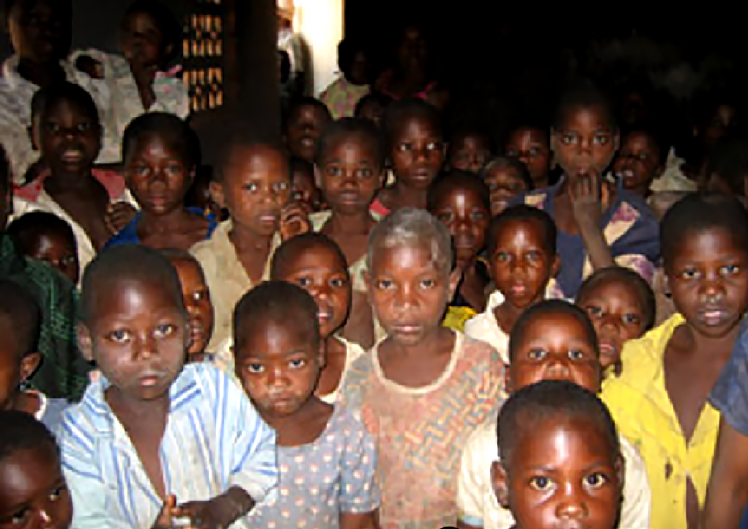
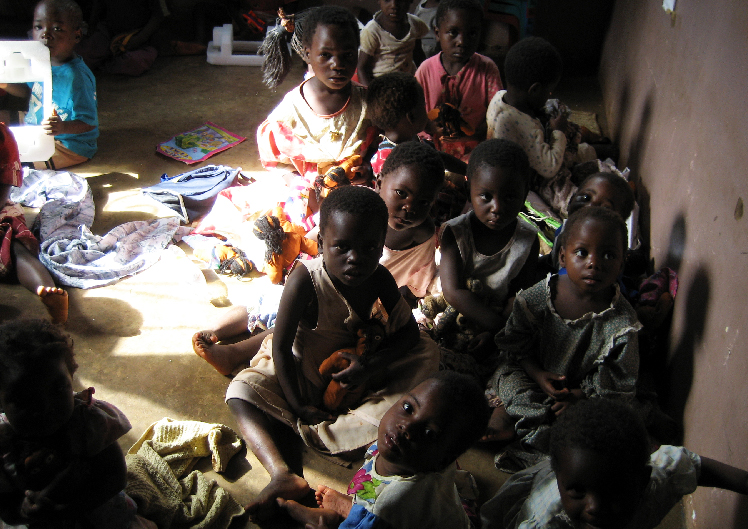
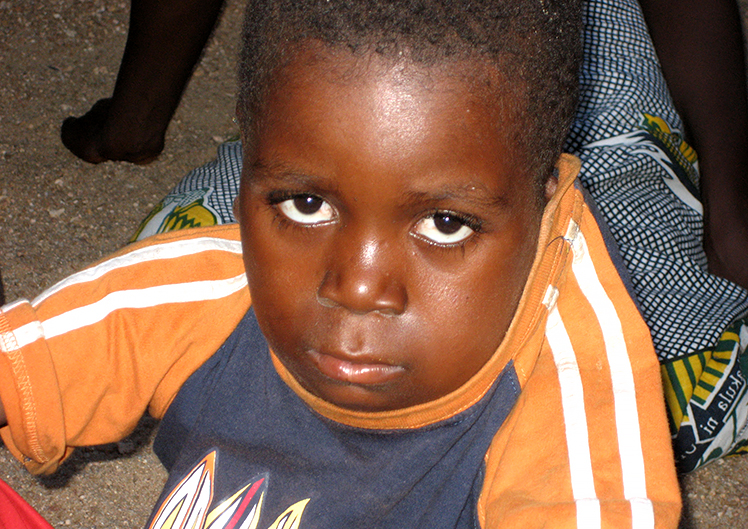
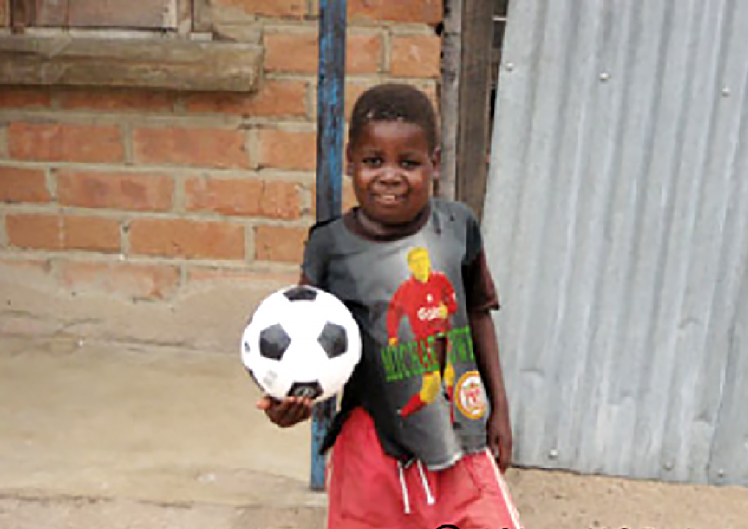
REPORT 2 - INCREASING ORPHANS
Republic of Malawi is the first country I’ve encountered with so many orphans and no war happening in recent years. Every district visited was over-flowing with orphans. At an orphanage home in Blantyre, 120 children were placed in two 225sqft rooms. Half of them are so-called “AIDS orphans.” There are also children who are HIV positive themselves, being infected in their mothers’ wombs. The principal of this orphanage home has 2 other homes, looking after 300 children in total. Children from 1 - 6 years old. We have been told that this orphanage home is mainly run by donations, and that they are not being able to receive much support from the government. The orphanage home I visited in Lilongwe had about 100 orphans to look after. They were receiving no support from the government, and everything had to be done with the help from individual volunteers and neighborhood people.
With the current situation, the number of orphans can only continue to increase. As a matter of fact, most of the adult HIV patients I’ve met have already lost their husbands/wives, and if they themselves are deceased, children are left on their own. All existing orphanage homes are well over capacity, and no light for betterment. For the people of this country who live on average of US$1.00 per day, it is not easy to look after the orphans. The principal of the orphanage home is concerned about the children’s future with painful expression on her face. If the same situation continues, soon the streets of Malawi will be filled with street children, who may end up becoming street gangs. Currently, orphanage homes in Malawi are having difficulties even to secure food, clothing, and shelter for the children.
AIDS Orphan (1) - Male (pronounced “ma-lay”)
Shot in April when left side of his neck was suppurated & swollen with fever & flies around it.
Shot upon visit this time, holding the soccer ball we gave him as a gift. The first smile from Male.
Do you remember the photo on the left? He is Male (now age 7), a boy we met in Chembe village on our last visit who was infected by AIDS through his mother. He lost both of his parents by AIDS at the age of 5, and since then lives with his 20-year old sister. Back in April, the left side of his neck was injured, got infected by germs, suppurated and his left cheek had been swollen with fever. Flies came around his wound, so he had his t-shirt constantly pulled up to his left ear to keep the flies away…he was the child who never smiled.
I regretted for not having my first-aid kit with me. That’s why I took a lot of antiseptic solutions, medical pads & medicine to stop suppuration with me this time.
When I arrived to his village, Male was called out by some villagers and shyly came walking up to me. I remembered him saying that he wanted to drink Fanta when I asked him what he wants to have upon my last visit, so I looked for a Fanta prior to my visit to his village, but couldn’t find any so I bought a can of coke & local grape juice for him. When I gave him the drinks, he finished them in quick gulps. The wound on his neck was closed. Although now both left & right were swollen, and the swell is larger.
As I spoke with the villagers, I found out that after our last visit in April, the injection of his wound got worse, and lymph nodes on both sides of his neck swelled to the max. They told me that he wasn’t even able to move. His 20-year old sister has not been able to get married yet, having difficulties earning money for Male’s hospital & transportation fees all this time. Seeing them in such situation, Mrs. Rose who works at a private clinic in Chembe while looking after the people as visiting nurse & clinic doctors donated some money for Male to get medications at the national hospital. The wound is not totally healed yet, but is finally closed, now he only needs to drink medicines. The immunity of HIV patients rapidly drops, so it takes ages for them to cure a simple wound. In addition to that, the mal-nuturitious state increases the possibility of complications to arise. Further more, the village does not have any electricity, and the water is taken from the nearby lake. The state of sanitation is not good either. Various environmental states put together have probably caused Male’s infection to get worse. But I’m glad…no need for first-aid kit any more. Lost his parents at 5, and Male was also born as an HIVb positive baby infected in his mother’s womb. I’m sure a 5-year old would have clear memories of his/her parents. It hurts to imagine how lonely and difficult it was for him in the situation he was put in… What if he died from that wound he has on his neck without being helped by Mrs. Rose & the clinic doctors?...truly scares me. AIDS is not only the problem of the people who got infected. Especially with mother-to-infant infection, there’s only tragedy awaiting for the HIV babies born…
I gave Male a soccer ball, a gift from us. His face suddenly made a huge smile. The boy who always looked down to the ground, the minute he faced up & saw it. I understand too well that it is not a good thing to do something for one particular child. But he’s been too hurt, worked so hard to hold on to himself for too long…I think that a boy that always faces down could be everyone’s hero. I told Male: “play the ball with everyone, OK?” and also asked the volunteer Mr. F to look after the situation: “if Male gets into problems because of this ball, please keep the ball at your place instead.” I have no idea how many years are left of Male’s life. But I pray that he live as long as possible with as many smiles as possible.
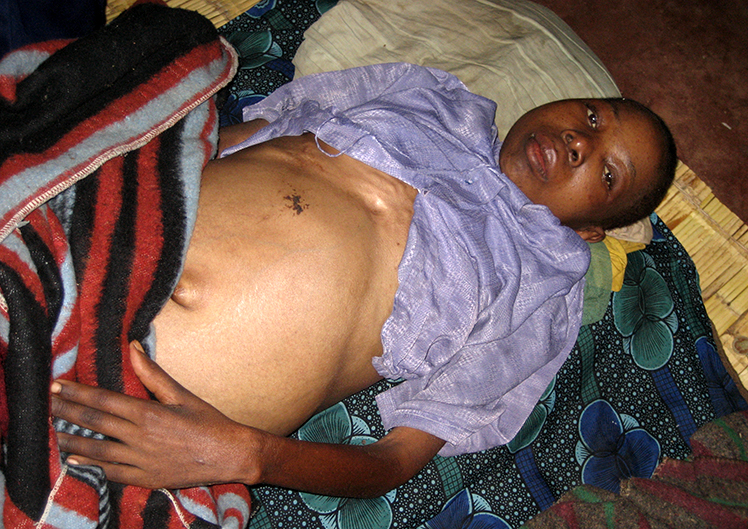
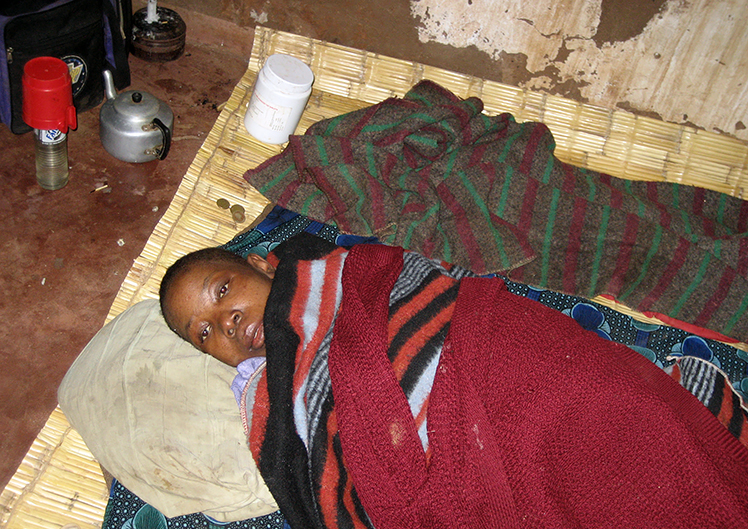
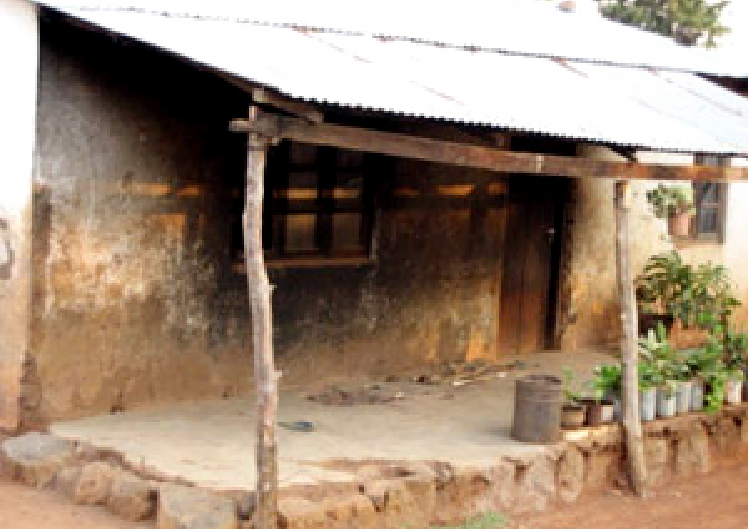
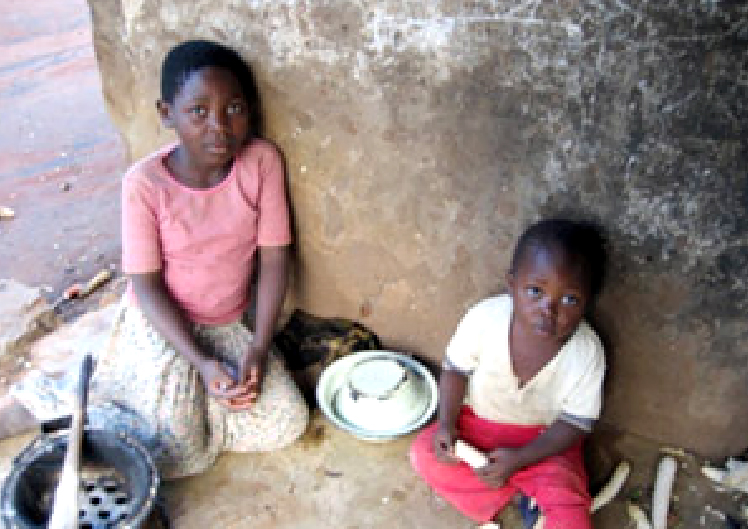
REPORT 3 - THE SAD REALITY
Do you remember the lady in the above photos? She is one of the stage-4 HIV patients I met upon my first visit to Malawi in April 2006. I have mentioned about her several times in other media, but I’ll make a brief summary of it first, for your reference. She is at Stage-4, an HIV patient in the final stage. The reason her stomach is swollen up is not because she is pregnant. It is due to ascites inside her stomach. Her body is extremely skinny. Her ribs are clearly shown, and her arms are so thin that they could break any moment. Although her left leg is swollen to twice the size of her right leg, making her unable to stand on her own. She lost her husband 2 years ago by HIV, and had been left alone with 3 children. She had no money, and obviously had no food. The brown-colored water placed beside her was her drinking water. There was literally nothing inside her house. And she was laid on the floor with only a thin straw mattress beneath her, without any underwear. I was told she didn’t have the transport fee to go to the hospital, which is only 20 yen (=approximately US$0.20). There existed a tragic reality of the poor.
And on my second visit to Malawi this time, I went to see her again. When I showed her photos to specialists in April 2006, I was already told she is in a state that no medication could possibly help. But I had a hope or a belief even, somewhere inside me, for her to be alive upon my second visit. I strongly believed that I would be able to see her again…but she was deceased. The principal from the orphanage home nearby her house was kind enough to explain what had happened. With the little donation we gave her in April, she went to the hospital. There she stayed in the hospital for 3 weeks, and came back home when her condition got a little better. But after 4 days at home, her condition made a sudden change and she had to go back to the hospital. At the end, she caught malaria and pneumonia at the same time, and ended her life in late July in the hospital.
As I got to the front of the house that lost its owner, I just couldn’t stop the tears from my eyes. I wasn’t able to help her after all. And wondered how the life had been for her… The principal of the nearby orphanage home hugged my shoulders tightly. I remembered her young sister living close by had been looking after her, and went to see her sister as well. There, I had been told an even more terrible reality.Her sister fell into tears as soon as she saw me, shaking all over, she hugged me and cried “my sister lost… my sister lost…” To this skinny sister with her breakingly thin arms around my neck and crying, I didn’t know what to say, I could only stroke her hair. I got raided by sentiment along with the sadness we shared. Her crying voice and that feel of how she wrapped her arms around me with all her force still remains in me.
We sat in the yard and started to talk about her deceased sister. Then I noticed something was wrong with this little sister. When I saw her in April 2006, she was tired from taking care of her elder sister, but she had shown occasional smiles. She wasn’t fat, but wasn’t as thin as she is this time. She looked completely different. Her face was filled with fatigue, and too thin. As our conversation proceeded on, I found out that following her elder sister’s death, she got ill as well and when she went to see a doctor, she also had been diagnosed as HIV positive. What a cruel reality for a girl who had just lost her beloved sister. She had been told she’s at late Stage-3. Only 3 months ago, she had been taking care of her sister at the final stage of AIDS, witnessed all the hardships and pain of the disease, and saw the end of her sister’s life. Now she herself is diagnosed as AIDS. She was tired both physically and mentally. Nevertheless, she took her sister’s 3 children with her and looks after the siblings.
It I was her, I won’t be able to bear such state. I would be seized with terror, I may even lose my mind. But look at this girl… I honestly feel how cruel a life can be. Isn’t there really anything we could do to change such situation…? The only thing I could do right now is to pray for her to get as much nutrition as she could, get proper medications, drink medicines, and live as much as she could….
Upon my re-visit to Malawi, 3 patients out of those I met from my last visit was deceased. As I cordially pray for them to rest in peace, I strongly felt that I shouldn’t forget this sadness in me. Besides the said 3 patients, there are countless number of HIV patients on this earth. Modern medical development has made it possible for people to slow down the rate of the AIDS progress by treatments at early stage of the disease and getting enough nutrition. But still, poor people are not being able to receive such medical development. I honestly hoped from the bottom of my heart that such reality shall be acknowledged by as many people on this planet as possible, and that the day that every people around the world live hand in hand ? in a real sense? would come in the nearest future. And I myself would like to think once again about what I could possibly do right now.
※ Reproducing all or any part of the contents of this site is prohibited without author's permission.
